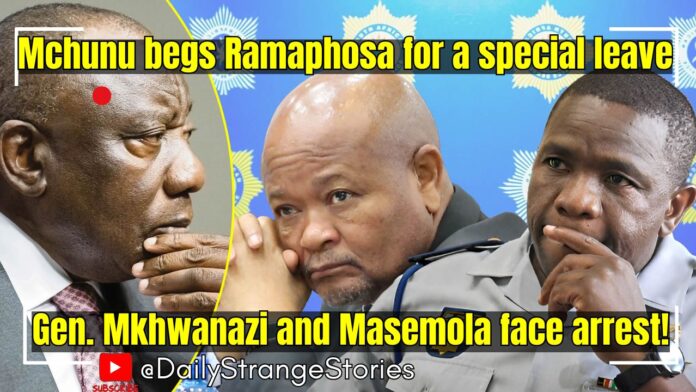JOHANNESBURG – In a move that underscores the seriousness of the ongoing disputes within the South African Police Service (SAPS), President Cyril Ramaphosa has placed Minister of Police Senzo Mchunu on special leave. The announcement, made on Sunday, comes as concerns mount over the increasing politicisation and potential factionalism within the country's security services.
"I welcome and respect the President’s decision and pledge my commitment to the process. Honour and integrity are the virtues I personally subscribe to and which we all need to make efforts to uphold. I stand ready to respond to the accusations against me and account to the citizens of the Republic, fully and honestly so,” Mchunu said.
President Ramaphosa has appointed Professor Firoz Cachalia as the acting police minister during Mchunu's leave.
These developments occur against a backdrop of growing anxieties about the future of South Africa's security apparatus. As the ANC's political dominance continues to wane, there is a heightened risk that the SAPS and other security agencies could become increasingly politicised, divided by internal factions, and potentially even fall outside of democratic control.
The gravity of the situation is underscored by the fact that this is perhaps the first time since 1994 that a President has found it necessary to address the nation specifically on issues related to security and disputes within the security cluster. The only comparable instance is President Ramaphosa's address during the outbreak of violence in KwaZulu-Natal (KZN) and Gauteng in July 2021.
While the immediate focus is on the claims made by KZN Police Commissioner Nhlanhla Mkhwanazi, it is essential to recognise the historical roots of politicisation within the police service.
Many observers trace the origins of this problem back to former President Thabo Mbeki's appointment of Jackie Selebi as National Police Commissioner. Selebi's tenure was marred by corruption and allegations of political interference, including the controversial decision to shut down specialised units, which has never been adequately explained.
The entanglement of the police and security services with ANC factionalism is also a well-documented concern. Aubrey Matshiqi has recounted how, in 2007, he advised members of the State Security Agency (SSA) to remain neutral during the ANC's Polokwane national conference, a plea that was ultimately ignored.
The Constitutional Court's ruling in the case of former SSA head Billy Masethla, who was dismissed by Mbeki for allegedly supporting Zuma, further highlights the politicisation of the security services. The court's decision to award Masethla compensation until the end of his term set a precedent with lasting implications.
Former President Jacob Zuma's use of the security services for political purposes has also been widely criticised, with his appointment of Richard Mdluli as head of police Crime Intelligence seen as a clear example of political interference.
Oscar van Heerden's account of an SSA room operating at the ANC's 2017 Nasrec conference further illustrates the extent to which the security services have become intertwined with the ruling party.
These incidents underscore the deep-seated nature of the problem and suggest that the current disputes within the police service may be symptomatic of deeper divisions and weaknesses within the ANC.
The behaviour of leaders within the SAPS and the South African National Defence Force (SANDF) is influenced by factors such as the political authority and legitimacy of elected officials. A police minister with strong political standing may find it easier to influence the actions of the police commissioner, even in the absence of explicit legal authority.
Conversely, a president with strong legitimacy may be able to exert greater influence over SAPS leaders, while a leader lacking legitimacy may find it difficult to command obedience.
In a society where there is strong public support for decisive action against crime, security service leaders may even perceive themselves as possessing greater legitimacy than democratically elected officials, particularly if they are seen as successful.
This dynamic increases the potential for police and military leaders to pursue their own agendas, as evidenced by Mkhwanazi's recent public criticism of the police minister.
The declining political authority and legitimacy of South Africa's politicians may make it increasingly difficult for them to exert influence over the security services, raising concerns about the potential for abuse of power.
Matshiqi has warned of the potential for a situation to develop where a particular figure amasses unchecked power, similar to J Edgar Hoover's reign over the FBI in the United States.
The fact that the current allegations involve dynamics within KZN is also significant, as the province's complex political landscape may foreshadow the future of national politics.
As the rest of the country also now has more parties to choose from, so is it likely that more police and military leaders support different groups, or different factions in different parties, underscoring the risks of a lack of centralised political authority.
While there are concerns about the potential for further politicisation and factionalism within the security services, there are also hopes that the government can work together to depoliticise these institutions, appointing individuals who are not aligned with any particular group or party.
It remains to be seen whether such efforts will be successful in safeguarding the integrity and independence of South Africa's security services.
President Ramaphosa has called on South Africans to support the commission in its work and, where appropriate, to provide any information or assistance the commission may require. The commission is expected to provide interim reports within three to six months, which will be sent to the Chief Justice and the Speaker of the National Assembly. He has also stated that the government will continue to build a safer country and that the SAPS and law enforcement agencies will function without hindrance, adhering to the rule of law and their respective codes of conduct.

Follow Us on Twitter











